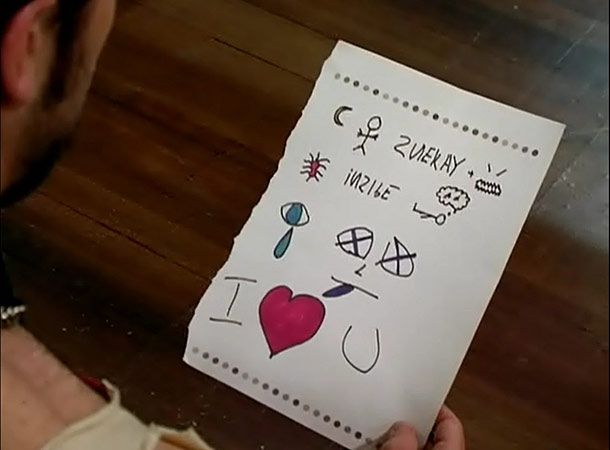|
Brainworm posted:It's like people who think in words. As in, I'm told that some people's actual thoughts take the form of an inner monologue. Like an episode of Scrubs I guess. how did those people think before they learned words?
|
|
|
|

|
| # ? Apr 19, 2024 18:47 |
|
Brainworm posted:It's like people who think in words. As in, I'm told that some people's actual thoughts take the form of an inner monologue. Like an episode of Scrubs I guess. If it's any comfort I find the alternative incomprehensible. What else would I think in?
|
|
|
|
Wallet posted:If it's any comfort I find the alternative incomprehensible. What else would I think in? That was my snap reaction too. I do usually produce a stream of words in my head when I'm thinking, which creates the illusion that the thoughts and the words are the same thing. But on reflection, the words are a byproduct of the thoughts. As soon as I try to write down the exact words that make up any complicated thought, the gap between the words and the thought becomes obvious.
|
|
|
|
greatZebu posted:That was my snap reaction too. I do usually produce a stream of words in my head when I'm thinking, which creates the illusion that the thoughts and the words are the same thing. But on reflection, the words are a byproduct of the thoughts. As soon as I try to write down the exact words that make up any complicated thought, the gap between the words and the thought becomes obvious. Yeah, I sometimes get words and letters as part of this, like, jumbalaya of confederated impressions. Sort of like a rebus, but more like: 
|
|
|
|
What are your plans to navigate AI writing, like essays from ChatGPT?
Eason the Fifth fucked around with this message at 23:33 on Jan 26, 2023 |
|
|
|
Eason the Fifth posted:What are your plans to navigate AI writing, like essays from ChatGPT? That's a really good question. There's a kind of response to ChatGPT that's like "how do I keep students from using it in my class?" That leads down a rabbit hole of improved plagiarism detection etc. etc. And I think that's fundamentally wrongheaded. It's like the "don't use Wikipedia as a source" mantra from the early 2000s, or the "no calculators in math class" from my childhood. You've got to understand the technology (and other resources) that students have, and help them learn how to use those things effectively. That's another way of saying that If students can use collaboration or technology to cheat, I'm not designing my assignments very well. I'm likely assessing the wrong things, too. What I want to do is prepare students for the world of research and writing that they're likely to encounter after graduation -- not keep 2021 trapped in amber. And so my assignments generally take the form of forward-looking assessments. That is, I think of some context in which students might apply what they've learned in my class, and build assignments around that. So one of my favorites is something like "My publisher is building an online repository of teaching materials -- videos, powerpoints, quizzes, and so on -- around [whichever book we're reading]. Create something for that repository." For advanced writing students, I like "Choose one of these publications and write an article for it." So my first instinct on ChatGPT is to (a) allow its use on any of these types of assignments and (b) require its use on at least one or two per course. I'm not going to say that in (for instance) 10 years, a whole lot of content generation will involve training an AI, but students ought at least prepare for the possibility, And so my first thought is using some variations of: 1) Use ChatGPT to produce an educational resource, (like an article, game, or slideshow) and then revise that draft manually in order to improve it. 2) Use ChatGPT to produce media that scores at or above X level on the following rubric, and then write a short response in which you explain how you did that. 3) Use ChatGPT to produce a product, and [some other tool] to produce a similar product, and write a response comparing them. Stuff like that. The reason I'm not using ChatGPT assignments right now is that it goes down too often. I'm not going to require students to use a tool when I can't reasonably guarantee access to it. But I'm also happy to encourage students use ChatGPT and similar tools to create whatever materials for class. If a student's creating an educational card game, for instance, they ought absolutely use an AI to produce the graphics.
|
|
|
|
Thanks for the great answer. I haven't taught in almost ten years now, but I remember building out some of my assignments with the advice you posted a long time ago in the thread -- back then, I think it was about using wikis as a collaborative tool for knowledge management. (I ended up doing a dollar-menu version of that idea with a class-wide Google doc that kept notes from everyone for everyone to use as a reference, and my students loved it).
|
|
|
|
Eason the Fifth posted:Thanks for the great answer. I haven't taught in almost ten years now, but I remember building out some of my assignments with the advice you posted a long time ago in the thread -- back then, I think it was about using wikis as a collaborative tool for knowledge management. (I ended up doing a dollar-menu version of that idea with a class-wide Google doc that kept notes from everyone for everyone to use as a reference, and my students loved it). Oh yeah. I remember doing that. I haven't taught a class that would benefit from that in a while (actually, that's not true: it would have been a really good move in last year's Haunted House stories). One thing that sort of stymied this is that our campus hasn't yet adopted any kind of collaborative document platform -- like, we're not a Google Campus, etc. -- but IT also insists that we keep just about everything we do for classes on college-managed platforms. So there's a lot of internal friction on those specific kinds of classroom projects.
|
|
|
|
Are you ever too old to get a Master's degree? I double majored in my undergrad about 7 years ago with English/Theatre, with focuses in Creative Writing and Dramaturgy, but I've held off on further education for both financial reasons, as well as because I feel like I need a career trajectory to justify pursuing extra degrees. Every former professor I've talked to has tried to hammer home the fact that academia won't feed mouths, but, like... I'm not interested in having a family, and I have no grand delusions that I'm going to be a millionaire. Is academia so depressing that you straight up think it isn't worth pursuing? If you're still at it, why? I love learning for learning's sake, and I like to think that's still worth it on some level.
|
|
|
|
Blue Labrador posted:Are you ever too old to get a Master's degree? I don't think so. I went to graduate school with people in their 50s and 60s who were doing it for the love. They were generally well-adjusted and happy people so I'm not going to take a dump on them. At the same time, graduate school can be an expensive hobby. Even if you're going for free (like on a TAship) you're trading a real income for a teaching stipend. quote:Every former professor I've talked to has tried to hammer home the fact that academia won't feed mouths, but, like... I'm not interested in having a family, and I have no grand delusions that I'm going to be a millionaire. Is academia so depressing that you straight up think it isn't worth pursuing? Academics are professionally miserable. Sad but true. I say this with love, but I have never met another population of professionals who were so invested in their own unhappiness. Also, I hear a lot of complaints from my fellow academics that are a little too based in entitlement. Like "I would make more as a high school teacher," which is (a) often untrue and (b) a much more difficult job. That issue is separate from what I'ma call the professional viability of a master's degree. There's some point in thinking about a degree in terms of dollars in and dollars out -- like, "will this thing pay for itself over X years?" You can sharpen your pencil on that, and depending on your tolerance for risk, your own financial goals, etc. that may be the end of the conversation. There are better ways to make a return on e.g. $40K than getting an M(F)A in English or Theater. But there are at least three other reasonable ways to think about education: 1) You can pursue knowledge for the sake of knowledge. Some people want to become an expert just for the purposes of becoming an expert. Totally valid. 2) You can pursue an education to find yourself: to figure out who you are and what matters to you. That can mean finding communities, traveling, joining clubs and organizations, and so on. 3) You can pursue an education to support yourself and your community. There are lots of courses of study that are socially necessary even if they aren't strictly profitable: teaching, social work, and so on. And people often pursue them because they feel some obligation to use their talents for the benefit of others. These aren't exclusive, right? You can have some reasons that pull from (1) and some from (3). I think the important thing is to understand why you're doing what you're doing; otherwise, you're gonna end up confused and unhappy when your expectations don't line up with reality. quote:If you're still at it, why? I love learning for learning's sake, and I like to think that's still worth it on some level. I'm still "at" being an academic. I'm a Dean now, and that's fine -- I still teach a few courses every years, and there's a lot of reward in doing administrative work that (for instance) makes it easier for other people to teach great courses. It's a lot more work than just being a professor, but I've also found that I need, like, a higher degree of structured challenge than a professorship provides.
|
|
|
|
Eason the Fifth posted:What are your plans to navigate AI writing, like essays from ChatGPT? On a similar note, is it possible for AI writing tools to be beneficial for students rather than just a plagiarism tool? I've been seeing ads for Quillbot lately on Merriam-Webster and it's gotten me thinking on what essay writing is like for high school and college students these days. On the one hand, I'm envious because I've always hated writing rigid research papers and anything to make that part more efficient would have been definitely welcomed by a younger me. On the other hand, though, I'm worried that the autofill features on Quillbot etc could lead to a deterioration in students' writing skills due to potential overreliance on these tools. Yet, at the same time, since it's supposedly scanning on what the student already wrote for suggestions it might help lead to more outside of the box thinking and develop alternate ways of saying the same thing for students. Thoughts?
|
|
|
|
Teriyaki Koinku posted:On a similar note, is it possible for AI writing tools to be beneficial for students rather than just a plagiarism tool? So I think you could do some really interesting teaching work in a standardized, sandboxed environment like Quillbot if it has a robust instructor toolkit. Like just for instance: 1) What if the only way a student could produce a citation was by selecting (or copy/pasting) text from their browser? Not only would you eliminate the all-too-common problem of fabricated sources, but you'd also be able to get relatively easy data on which sources your students were reading for different projects. 2) What if the instructor end of this had some analytics? That way, you could see (for instance) what decisions a student made during the drafting process, or check their drafting speed, or see how they actually build their piece of writing (outlining vs. throwing words on the page, for instance). You could do a lot of process work that isn't really possible in a system where the only thing you really get to see are completed student projects. I'll bet a dollar you could also more effectively spot LD students by looking for cues in their composition process. 3) What if an instructor could set the level, degree, or style of the editorial suggestions the environment offers? So, for instance, you could set the auto-suggestions to target a 4th-grade reading level, or 8th-grade, or 12th-grade. That kind of tooling would be a huge boon in more advanced writing classes where you're asking students to zero in on a specific audience rather than just slap down a bunch of words that demonstrate an understanding of content. 4) What if you could deploy some advanced templates that took students from premise to project? Like, They Say I Say has a pile of these that would be really useful for helping students develop their first article (things like "the balance of research says __________, but the specific assumption that __________ is unsupported by research"). So these kinds of tools have a lot of potential when you think of them as teaching environments rather than strictly assistive technologies. Think of how Engineering courses use e.g. MATLAB. In the same way, I'm not really concerned that students will fail to develop essential skills by using assistive tech. I like to say that student=person+tool, meaning that meaningful skill development is predicated on which technology or technologies you decide to allow. And, as a rule, you therefore want to stay current. Assistive writing tech isn't going away, and so you probably want to (a) learn how to make it an effective part of your teaching and (b) help students learn to use it in a way that will serve them in whatever they do after graduation.
|
|
|
|
that is an astonishing answer
|
|
|
|
Qualia posted:that is an astonishing answer Hopefully that's the good "astonishing" and not the "astonishing" my wife uses to talk about how my suits fit.
|
|
|
|
Any good bits of general wisdom you've picked up over the last few years (either from texts or from real life)?
|
|
|
|
My son took part in his school class's production of Tempest, and played the role of Stephano with gusto. I've not watched or read this play previously (just picked up some quotes by cultural osmosis), so was quite surprised to see that whilst the rest of the class were pretending to be fighting against the storm, my son was waving his water bottle around, and stumbling like Captain Jack Sparrow. This led me to wonder - did Shakespeare do anything interesting with "comic relief" characters in otherwise serious plays? Was he just following the standards of the time, or was he doing something clever or ground-breaking with them?
|
|
|
|
12Apr1961 posted:[...] This led me to wonder - did Shakespeare do anything interesting with "comic relief" characters in otherwise serious plays? Was he just following the standards of the time, or was he doing something clever or ground-breaking with them? What Shakespeare did with his comic relief characters is a kind of subset of what he did with characters more generally. Shakespearean characters generally want validation. Maybe they want to be valued, or maybe they want to be seen in a certain way (as a good son or a good King, for instance). And they also begin their stories by thinking and acting in ways that hurt themselves and others. A Shakespearean character might want to be valued by being seen as the smartest, most sensitive person in the room, and try to accomplish that by making everyone else look intellectually and emotionally obtuse. That's Jaques in As You Like It. And that's funny in a painful kind of way. You get this guy mooning over wounded deer, correcting everybody whenever they say anything, and the harder he tries to live up to his own expectations the more unlikable he becomes. In a story like Jaques's, one of two things happens: Jaques either learns to behave differently -- maybe he realizes that he can be valued more for his honesty than his pretentiousness -- or he doesn't. In J's case, he doesn't. In pre-Shakespearean plays, you can't really talk about character development in those terms. If characters change, they adopt a new philosophy vis-a-vis fate or God. Irredeemable characters get their comeuppance. But they don't look at their own behavior as a problem that needs solving. And so comic characters in pre-Shakespearean stories generally exist to set up a trick, and the story of the play is really the story of whether the trick succeeds or fails. Like, there are tons of stories where some young dude tricks a greedy old man out of his much younger wife, right? Chaucer is full of them. That story begins when the young man shows up (or when the much younger wife does) and ends YM and YF bang. There's no add-on where the greedy old man is like "huh. Looks like I need to change my behavior if I want to be happy" or the YW or YM is like "wow. I've hurt a lot of people and (A) I need to change or (B) I'ma keep on truckin'."
|
|
|
|
Brainworm posted:It's like people who think in words. As in, I'm told that some people's actual thoughts take the form of an inner monologue. Like an episode of Scrubs I guess. This makes sense- you can't hear your host's internal monologues because you settled in the language region. I'm afraid when a brainworm does that then the words stop. Easy mistake. Try settling in another lobe next time if you want to hear them. Hth.
|
|
|
|
So, I was reading Red Harvest by Dashiel Hammet, published 1929 and I had a question When did Dick become a synonym for penis? In the novel, a dick/dickhead is used to refer to a police detective. I'm vaguely aware of Robert's normally being known as Dicks up until very recently, so when did calling Robert's (and since we're on the subject, Bob) go out of fashion and why did dick become a byword for
|
|
|
|
A Festivus Miracle posted:So, I was reading Red Harvest by Dashiel Hammet, published 1929 and I had a question in 1891 https://www.etymonline.com/word/dick (or more likely, a decade or two earlier, but that's when that usage was first recorded in print)
|
|
|
|
Earwicker posted:in 1891 The OED confirms that -- no surprise. But dick was much earlier slang for some dude you were banging. Check this 1654 example from New Brawle: quote:You can..lie like a logge by me all Night, and when you rise, turn your back-side towards me, as though I should kiss that: out thou unnaturall Knave thou; thou feeble dick thou. And in this 1707 example from Wit and Mirth: quote:For when Country Gillians do play with their Dicks, Then London must Father their Bastards. So, on one hand, I'm inclined to respect the idea that "dick" for "penis" originated c. 1890. On the other, it's a little surprising that a synecdotal or metonymic use of the 1654 "dick" (lover) took 150 years to show up in print. But the evidence is what it is. Anyway: An even earlier usage is "Dick" for "ordinary guy," as in "every Tom, Dick, and Harry." That usage shows up in 1553: quote:Desperate Dickes borowes nowe and then againste the owners wille, all that euer he hathe. I'm tempted to think that this is the most direct ancestor of the (1905) "dick" for "private detective" -- meaning something like "an ordinary person working in the capacity of a private detective," rather then e.g. a non-civilian investigator. “dick, n.¹, sense 1.b”. Oxford English Dictionary, Oxford University Press, July 2023, <https://doi.org/10.1093/OED/2812541297>
|
|
|
|
Hi prof, I’m reading William Gibson’s Count Zero and came across a word that’s difficult to look up: slay. One of the main characters is studying this story’s McGuffin, an assemblage in the style of Joseph Cornell, a wooden box with carefully arranged small objects. ”Bone and curcuit-gold, dead lace and a dull white marble rolled from slay.” As a noun, slay can be a reed, as in a part of a loom. But that is a comb-like thing that you can’t roll up into a marble. Or is it just a misprint and the marble is rolled from clay?
|
|
|
axolotl farmer posted:Or is it just a misprint and the marble is rolled from clay? My copy says "a smooth white sphere of baked clay" when the box is first introduced, and "a dull white marble rolled from clay" in the passage you quoted. So yeah, misprint.
|
|
|
|
|
Thanks  I spent far too long trying to look up alternative meanings for slay, until I wrote that post and welp. It really is a good story.
|
|
|
|
After too much time working its way through my backlog I just finished Shakespeare's Storytelling. It was a great read and I'll be recommending it to others like me who had very little literary conceptual education or Shakespeare exposure. It was a really strong move to make the final exercise autobiographical! I do have a couple errata notes if that's of interest; the only significant one is this shocking ignorance of the source text (at p.142): quote:Luke Skywalker might want to see himself as really different from Darth Vader, but they're the only two people in the galaxy who own light sabers. More seriously, I'm curious if you could speak to the notion of motivation as you conceive it, specifically the necessary element that in Shakespearean work motivation is about how a character "wants to be seen". I'd like to argue that while it's possible to read this framing into each character's motivations, this seems to plausibly be an artifact of the medium: that this is a stageplay from a period where, in stageplays, the character's motivation is expressed verbally to an audience, sometimes directly. Could you provide any counterexamples from other plays? I apologize, I expect you've fielded this question before. Also are you all right with being identified as the author of this text in the goonmade books and "I just finished a book" threads? Discendo Vox fucked around with this message at 10:04 on Jan 21, 2024 |
|
|
|
Hello. Long time since I've posted in this thread, possibly years. Over that time I've had a few murder mysteries published, I can post a link if anyone's interested. I've just finished writing my first novel, as in not a murder mystery. I'm trying to find some beta readers before I start shopping it around to publishers and agents. I hope I'm okay posting this here, I'm at a bit of a loss as to where to get early readers. If anyone is interested, can you email me at harrisonthewriter@gmail.com please? Here's a blurb I've drafted up, so you know what you're getting into. quote:When a meteorite crashes into the forest just outside Sudbury in the Wold, a peculiar array of characters: journalists, hippies and scientists, all start flocking to the sleepy village. And with them they bring the prospect of friendship, romance, and rivalry, turning Maggie’s quiet life upside down.
|
|
|
|
Discendo Vox posted:[...] I'm curious if you could speak to the notion of motivation as you conceive it, specifically the necessary element that in Shakespearean work motivation is about how a character "wants to be seen". I'd like to argue that while it's possible to read this framing into each character's motivations, this seems to plausibly be an artifact of the medium: that this is a stageplay from a period where, in stageplays, the character's motivation is expressed verbally to an audience, sometimes directly. Could you provide any counterexamples from other plays? I apologize, I expect you've fielded this question before. So let's start here. In general, pre-Shakespearean stories had characters with external motivations: they want to achieve a specific, tangible thing for reasons that (a) aren't psychologically or emotionally complicated and that (b) are assumed by the story or text to be self-evidently important. In a morality play like Everyman, for instance, Everyman is looking for salvation and simply needs to learn how to attain it. And the whole process is factually-based and emotionally straightforward. He learns that good works are the way to Heaven and that's that. You can still see external motivations at work stories that aren't character-driven i.e. in which the focus isn't on a character's process of self-discovery and change. Indiana Jones is already authentically Indiana Jones. James Bond is already authentically James Bond. These characters don't learn to become better versions of themselves (or significantly fail in the attempt) and so the audience doesn't need to be told who they aspire to be. They are already who they aspire to be. Their stories focus on what they do and not who they become by doing it. So there's a whole category of externally-motivated characters -- not in Shakespeare, but in stories both ancient and modern -- whose motivations aren't easy to express in terms of "how they want to be seen." They're out keeping the Ark of the Covenant away from the Nazis or keeping Goldfinger from doing whatever the gently caress Goldfinger does (blowing up Fort Knox?) and their stories are mostly about how they get it done. And so a "how they want to be seen" motivation isn't strictly an artifact of the medium. You can have a perfectly good play or a movie that features an essentially static and externally-motivated character (say, Sherlock Holmes) who gets what he wants (solving the crime), and that motivation doesn't need to have a psychological or emotional dimension. All that said: when a character is internally-motivated -- they aspire to become something that they aren't already, or discover that they need to change in order to become who their world needs them to be -- some version of "how I want to be seen" motivation is pretty much inescapable. A story needs to tell the audience which direction a character's gonna move in (or try to move in) and so -- from the jump -- it'll tell you how a character wants to be seen and why they aren't already seen that way. quote:Also are you all right with being identified as the author of this text in the goonmade books and "I just finished a book" threads? That's fine with me.
|
|
|
|
Thanks, that's a very helpful explanation, and clarifies for me the relationship between the internally motivated character and the nature of shakespeare's contributions. FYI the review's over here.
|
|
|
|
Discendo Vox posted:Thanks, that's a very helpful explanation, and clarifies for me the relationship between the internally motivated character and the nature of shakespeare's contributions. FYI the review's over here. Thanks for the review!
|
|
|
|
Question about Themes here: I have always thought that a theme was something that was a full sentence and referenced a comment or lesson from the text without referring to specifics, such as characters (e.g. Power Rangers being something like “We are stronger if we work together” or something like that), however online sources often refer to one word descriptions as themes (e.g. “Violence”, “Friendship”, etc). Are these themes, or topics? Is my definition incorrect, or am I thinking of something else?
|
|
|
|
I think Brainworm has said that he doesn’t like the concept of “theme” very much, because it’s rather reductive.
|
|
|
|
I can't put my finger on why “He was with my mom in the Amazon when she was researching spiders right before she died.” is meme worthy.
|
|
|
|

|
| # ? Apr 19, 2024 18:47 |
|
Silver2195 posted:I think Brainworm has said that he doesn’t like the concept of “theme” very much, because it’s rather reductive. I've said that before, and I probably even called theme "reductive." What I should have said is that theme is imprecise. As I understand it a theme is an abstract idea or concept that is repeated throughout a story. It's different from a refrain in that a refrain is a phrase or set of words repeated verbatim (like "so it goes" in Slaughterhouse-Five), while a theme can comprise a set of phrases that are all in orbit around the same idea. Just for instance: Coco is in heavy rotation in our house right now. (If you haven't seen Coco it's a movie about a kid from a family of shoemakers who wants to become a musician, and in the process gets trapped in the land of the dead on Cinco de Mayo). And Coco has several themes. Family is one. Music is another. And they are all expressed in different ways by the various things that characters say and do, i.e. characters say things about music and family, but also e.g. play music and differently comport themselves toward their families. The problem with "theme" as it's commonly used is that all it denotes is repetition. This idea, music or family or whatever, comes up again and again. And as a student or a critic, that's not much use. Ideas get repeated for really different reasons. Just for instance: in Coco, music is a symbol. The characters think about music in different ways, and these differences help describe how the characters are different from one another. Ernesto de la Cruz, for instance, uses music to impress the public and get famous. Hector uses music to support his family (and especially his kids and grandchildren). Miguel (ultimately) uses music to connect with his family and tell their story. Family, on the other hand, is what I'd call a moral vision -- a sort of baseline statement about how characters in Coco ought behave toward one another. All these characters (Miguel, Hector, Mama Imelda) eventually arrive at the same moral conclusion about family: family trumps individuals (or "supporting your family is more important than your individual bullshit"). Mama Imelda, for instance, drops her "no music" rule when it becomes clear that enforcing it will hurt her husband (Hector) and great-grandson (Miguel); Miguel, for his part, abandons his dream of being a musician when he realizes that sticking to it will hurt Hector and Coco. And so on. So you've got two ways that a "theme" gets used in Coco, and they're both really different: one (music, the symbol) tells us how characters are different a the beginnings of their stories. The other (family, a moral vision) tells us how they become alike at the end. And so calling both of these things themes is kind of a weird stopping point. It identifies something formal about Coco but doesn't say anything about how that thing shapes the story or why it's there in the first place. It's sort of like describing a poem's rhyme and meter. Nothing wrong with that, but it's not so important that high school teachers ought to emphasize it. Brainworm fucked around with this message at 17:54 on Feb 16, 2024 |
|
|





















